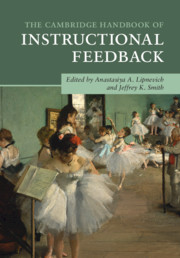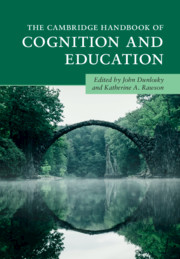The Cambridge Handbook of Instructional Feedback
Part of Cambridge Handbooks in Psychology
- Editors:
- Anastasiya A. Lipnevich, Queens College and the Graduate Center, City University of New York
- Jeffrey K. Smith, University of Otago, New Zealand
- Date Published: November 2018
- availability: In stock
- format: Paperback
- isbn: 9781316631317
Paperback
Other available formats:
Hardback, eBook
Looking for an inspection copy?
This title is not currently available on inspection
-
This book brings together leading scholars from around the world to provide their most influential thinking on instructional feedback. The chapters range from academic, in-depth reviews of the research on instructional feedback to a case study on how feedback altered the life-course of one author. Furthermore, it features critical subject areas - including mathematics, science, music, and even animal training - and focuses on working at various developmental levels of learners. The affective, non-cognitive aspects of feedback are also targeted; such as how learners react emotionally to receiving feedback. The exploration of the theoretical underpinnings of how feedback changes the course of instruction leads to practical advice on how to give such feedback effectively in a variety of diverse contexts. Anyone interested in researching instructional feedback, or providing it in their class or course, will discover why, when, and where instructional feedback is effective and how best to provide it.
Read more- Illustrates how providing feedback influences student achievement
- Emphasizes the practical uses of assessment information for educators of all levels and subjects
- Addresses most, if not all, subject areas and learners at different levels of development
- Hosts a wide range of leading researchers from around the world and shows the contrasting goals of education from many different cultures
Reviews & endorsements
'Feedback is powerful but variable: this book addresses both themes in a manner that will set the scene for the next decade of research and practice on feedback. The balance of topics, the richness of interpretation of the research, and the directions as to 'where to next' makes this the go-to book on feedback research.' John Hattie, Laureate Professor, University of Melbourne, Australia and Chair of the Board of the Australian Institute for Teaching and School Leadership
See more reviews'Authoritative, comprehensive, and wide ranging. This is the go-to-guide on instructional feedback. Required reading for anyone interested in developing a deeper understanding of the who, what, when, why, and how of instructional feedback.' Ronold A. Beghetto, University of Connecticut
'This is a remarkable collection and an essential addition to the libraries of researchers and practitioners alike. The chapters provide analyses of instructional feedback that are both wide-ranging and deeply examined. No matter what age group, subject, or context is your focus, you will find a wealth of critical information and creative ideas in this handbook.' Anita Woolfolk Hoy, Professor Emerita, The Ohio State University
'This handbook is an outstanding and thorough review of research on instructional feedback from editors Lipnevich (Queens College and the Graduate Center, CUNY) and Smith (Univ. of Otago, New Zealand), with contributions from academic researchers spanning the globe.' S. W. French, Choice
Customer reviews
Not yet reviewed
Be the first to review
Review was not posted due to profanity
×Product details
- Date Published: November 2018
- format: Paperback
- isbn: 9781316631317
- length: 648 pages
- dimensions: 253 x 177 x 33 mm
- weight: 1.18kg
- contains: 36 b/w illus. 35 tables
- availability: In stock
Table of Contents
Foreword Valerie Shute
Preface Anastasiya A. Lipnevich and Jeffrey K. Smith
Part I. Theoretical Foundations: Methods and Concepts:
1. Feedback: at the heart of – but definitely not all of – formative assessment Dylan Wiliam
2. Becoming proficient: an alternative perspective on the role of feedback Gordon Stobart
3. Summative and formative feedback Susan M. Brookhart
4. Toward a taxonomy of written feedback messages Jacqui Murray, N. Ruth Gasson and Jeffrey K. Smith
5. Methods in feedback research Gavin T. L. Brown and Lois R. Harris
Part II. Domain-Specific Feedback:
6. Assessment feedback in primary schools in Singapore and beyond Kelvin H. K. Tan and Hwei Ming Wong
7. Instructional feedback in writing Steve Graham
8. Instructional feedback in mathematics Marian Small and Amy Lin
9. Looking closely at mathematics and science classroom feedback practices: examining artifacts, students' products and teachers' communications Maria Araceli Ruiz-Primo and Heidi Kroog
10. Instructional feedback in music Kelly A. Parkes
11. Feedback and noncognitive skills: from working hypotheses to theory-driven recommendations for practice Dana Murano, Jonathan E. Martin, Jeremy Burrus and Richard D. Roberts
12. Feedback in tertiary education: challenges and opportunities for enhancing current practices Jacques van der Meer and Phillip Dawson
13. Instructional feedback in medical education Joan Sargeant and Christopher Watling
14. The 360-degree feedback at workplace: a transformative learning perspective Vidya S. Athota and Ashish Malik
Part III. Contexts and Sources of Feedback:
15. Technology-enhanced feedback Cassim Munshi and Christopher C. Deneen
16. Feedback and game design Bruce D. Homer, Teresa M. Ober and Jan L. Plass
17. Feedback in the context of self-assessment Heidi L. Andrade
18. Providing formative peer feedback: what do we know? Ernesto Panadero, Anders Jonsson and Maryam Alqassab
19. Feedback, correctives, and the use of pre-assessments Thomas R. Guskey
20. Teacher expectations and feedback practices in South African schools Anil Kanjee
21. Interactive assessment: cultural perspectives and practices in the nexus of 'heart or mind' Masahiro Arimoto and Ian Clark
22. Instructional feedback in animals Allison B. Kaufman and Michele M. Pagel
Part IV. Student Responses to Feedback:
23. The emotional dynamics of feedback from the student's point of view Rick Stiggins
24. Facilitating students' active engagement with feedback Anders Jönsson and Ernesto Panadero
25. Performance feedback and emotions Thomas Goetz, Anastasiya A. Lipnevich, Maike Krannich and Katarzyna Gogol
26. The relationship between creativity and feedback Molly Holinger and James C. Kaufman
Part V. Concluding Remarks:
27. Instructional feedback: analysis, synthesis, and extrapolation Jeffrey K. Smith and Anastasiya A. Lipnevich.
Sorry, this resource is locked
Please register or sign in to request access. If you are having problems accessing these resources please email [email protected]
Register Sign in» Proceed
You are now leaving the Cambridge University Press website. Your eBook purchase and download will be completed by our partner www.ebooks.com. Please see the permission section of the www.ebooks.com catalogue page for details of the print & copy limits on our eBooks.
Continue ×Are you sure you want to delete your account?
This cannot be undone.
Thank you for your feedback which will help us improve our service.
If you requested a response, we will make sure to get back to you shortly.
×



